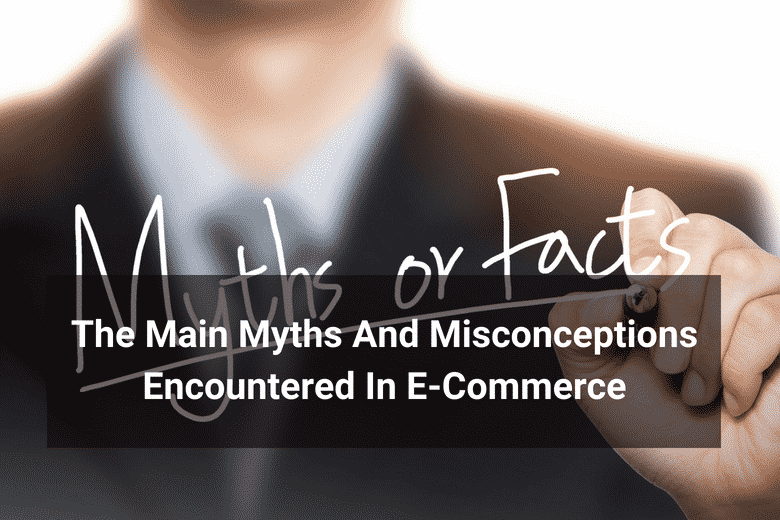We all agree that digital technology has completely transformed the world. Only a few years ago, mobile internet was unheard of but today, shopping is only a few clicks away through tablets and smartphones. To keep up with the growing demand, shopping methods are changing quickly. Through e-commerce websites, we are able to find the products we desire online. However, there are people who hold a lot of misconceptions regarding online business. Here, we shall bust the cloud myths surrounding e-commerce.
I. Online products sell themselves
Some people think that customers are easier to find online and that sales start zooming as soon as the business website is launched. After building the site, you don’t simply sit back and wait for clients to come. A lot of marketing is required for your products or online services to start selling. Just the way you work hard for your commodities to sell in the real world markets, you must work hard too for online sales to pick.
Successful e-Commerce people employ realistic marketing strategies like they would for offline businesses. Whoever told you that digital is easy must have lied to you. Unless you have a groundbreaking product, there is no way it can sell itself. The secret is to promote it continuously.
II. Traffic rolls in automatically
This is another big misconception regarding e-commerce. Even the most attractive commercial websites don’t gain automatic traffic. Without proper SEO mechanisms, your site may fail eventually. Online traffic is very different from the traditional one to a physical store. Internet-based marketplaces require serious efforts to drive prospects. Do not expect the prospective buyers to come easily to your site without some incentives. Without good promotional campaigns, you will only get a few visitors.
If you are new to e-Commerce, consider hiring an expert to help you with SEM – Search Engine Marketing, SEO – Search Engine Optimization, PPC – Pay Per Click, and SMM – Social Media Marketing. These strategies will increase your site visibility on SERPs thereby increasing the overall traffic.
III. You need a physical location to host events
This myth should not hold you back. Not every online business requires a physical location. You should be able to promote your products whether you have a physical business address or not. You have probably seen pop-up shops all over testing new products or boosting the sales of the existing products. You should also try come-buzz to benefit your online business. Whether you want to keep the location temporary or permanent, it is all up to you and dependent on your needs.
IV. The opportunity to give enough product information is limited
Don’t let this misconception confuse you. Online markets do not limit the volume of visual content or product information. Those who hold on to this lie end up offering too little information or too long product descriptions. There is no need to give unnecessary information because it ends up confusing prospective clients who then opt not to buy. Before you create content for your commercial site, think carefully and make the descriptions simple and comprehensible.
Include an online support page where clients can learn more about the product instead of over-stuffing the homepage with TMI. If you are dealing with electronic commerce consider adding separate documents which clients can download to check for manuals and technical details. Remember to add unique photos which will differentiate your brand from other sellers. Thankfully, we have better technologies that allow images to be zoomed so that visitors get to see clearly what’s on the table.
V. Low prices drive online sales
Regardless of the market experience and the size of your business, never try to attract clients with low prices. This is a very archaic selling factor. Of course, you want to give competitive prices and the typical consumer always wants to pay less for more. Nonetheless, other factors come in to determine the final consumer decision e.g. the credibility of your business, shopping experience, customer support, the popularity of your brand, and engaging storefront.
Moreover, cheap products are often associated with low quality and most clients see them as dead stock. In other words, price competitiveness is not always the key to driving online sales. Instead of using cheap prices, why not include loyalty programs, free shipping, discounts, first-class customer service etc? Think about techniques that will make your products more attractive and engaging.

VI. The sales taxes are complex
Sure, sales taxes are not easy and every country provides its own rules pertaining to filing deadlines, standards, and rates. But it doesn’t have to be like this. All you need is to stay up-to-date on the changing laws by using Avalara. They will take care of your filing hence make your work easier.
VII. An e-commerce website is all you need
Do not fall a victim of this misconception. A website is not a complete plan for your business. To start enjoying online sales, you need more than just stocked databases, shopping carts, and payment methods. The truth is a website is only a part of the business plan. This tool needs to work in tandem with other methods for your business to survive the current competitive marketplaces.
Creating and managing an e-commerce website is not hard but the most important thing is to analyze the current market trends plus the potential risks. You must also understand consumer’s behavior, what motivates them and find out the promotional strategies that actually work. As you can see, there are many aspects that come into play for an online business to succeed.
VIII. One Language Support
Most e-stores use one language, especially English. It is wrong to assume that English is understood everywhere if you run an international brand. Recently a research on e-commerce was conducted and it revealed that 30% of online consumers buy products from e-stores which are not designed in their native language. Even if buyers tend to ignore sites with foreign languages, they are sometimes attracted by visually appealing goods.
For this matter, you should consider including a multilingual online support for your business. Make sure that the most popular languages like English, German, Italian, Chinese, French, and Spanish are supported. With a mutual understanding with clients from various countries, you will be in a position to create strong relationships with both international and local customers.
IX. Revenue is the only performance metric
Obviously, you want to make profits and increase revenue but they don’t always indicate the entire well-being of your business. You can still experience low conversions even with an effective online campaign. Unless you set medium-specific metrics and objectives, you cannot exactly tell whether your marketing strategy failed or your site needs a boost. It is common for business people to feel frustrated when their social media marketing campaigns fail to drive sales.
No form of marketing works automatically; it is about taking chances and waiting to see what works best. Your brand awareness cannot be measured solely by the revenue generated. The best advice you can take is to have an ultimate goal of every strategy and find a way to measure it. For instance, use engagement metrics to measure the success of your PR, content strategy, and social media marketing. Every channel requires a unique metric and in turn, it will help you make better decisions.
E-Commerce Connect is very important if you want to succeed in the long-run. Whether you are new to the concept or have an established business, the most important thing is to research. Understand what you are in for and set realistic goals. Above all, do not let the above 9 misconceptions mislead you. Instead, rely on data-based facts to determine the right steps for your business.
Author’s bio
An expert in e-commerce data, a digital marketing specialist, and an MBA holder, Joshua Robinson has more than 7 years of experience in online e-commerce platforms and sales. He is excited to share his experience with anyone on Edu Birdy and other educational sites. Joshua works for various industries across the globe, employing e-commerce solutions and solving many Big Data issues.

Ready To Upgrade Your Logistic Solution?
Speak to Floship ecommerce logistic consultant about improving your global support chain today





